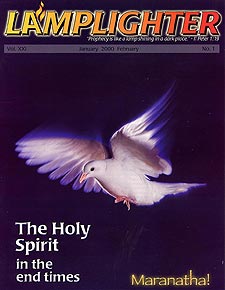Holy Spirit Baptism
What is it? When does it occur? How is it manifested?

Because I emphasize the Holy Spirit in my teaching and preaching, I am often asked if I am “Charismatic.” I usually respond to that question by asking what the person means by the word.
I do that because I have found that the word, Charismatic, means many different things to different people. To some, you are Charismatic if you raise your hands in worship to God. To another, you are Charismatic if you believe the Holy Spirit is alive and well. Another person will label you “Charismatic” if you believe that God still performs miracles. Some just use the word as a label for anyone they disagree with spiritually.
The strangest definition I ever ran across came from a well meaning lady who told me that “Charismatics are those folks who grin a lot!”
Well, I love to praise the Lord. I like to lift my hands to the Lord in worship. I certainly believe in the reality of the Holy Spirit and the continuing miracle working power of God. And, yes, I do grin a lot because I am constantly rejoicing in the joy of my salvation. But I am not Charismatic in the sense in which that word is used by the Charismatic Movement.
Definition of Charismatic
As I understand the term, a Charismatic is a person who believes that a Christian should seek a post-salvation experience called “the baptism of the Holy Spirit” which is validated by speaking in tongues.
By that definition, I am definitely not Charismatic. I do not believe the Bible teaches that we are to seek any special experience in the Lord that is manifested in tongues.
But I do believe in Holy Spirit baptism, just as I also believe in the gift of tongues. And I think the time is long overdue for us to do some serious teaching and preaching about both of these topics within Evangelical Christianity.
I say that because I believe there is a “Holy Spirit phobia” within Christendom at large. Many Christian leaders have recoiled in horror to the excesses and abuses of the Charismatic Movement, and their reaction has been to throw the baby out with the bath.
The result is that the Holy Spirit has become a taboo topic. In the process, the Spirit has been quenched and grieved, and we have ended up with powerless Christians and churches.
The tragedy is that many Evangelical Christians would react the same today as the disciples at Ephesus did when Paul asked, “Did you receive the Holy Spirit when you believed?” Their answer: “No, we have not even heard whether there is a Holy Spirit” (Acts 19:2).
Types of Baptism
In Hebrews 6:1-2 we are given a listing of “the elementary doctrine of Christ.” We are told that the items in this list constitute the foundation of the faith and that we are to move on beyond them “into maturity.”
One of those items listed is termed “instruction about baptisms.” Note that the word, baptism, is in the plural. This clearly indicates that there must be more than one type of baptism — and there is.
The Bible speaks of water baptism, Holy Spirit baptism, and baptism by fire. John the Baptist said point blank that Jesus would baptize us with the Holy Spirit and fire (Matthew 3:11).
When I was growing up in the Church, I heard hundreds of sermons on water baptism, but never once did I ever hear a single sermon on either the baptism of the Spirit or the baptism of fire. How can we move on into maturity when we have never covered the fundamentals?
The Baptism of the Spirit
So, let’s take a look at Holy Spirit baptism. I believe there are at least three types of Spirit baptism. The first is what I call the baptism of the Holy Spirit. I think it occurs at the point of conversion.
The Bible teaches that the Holy Spirit is God’s Evangelist, drawing unbelievers to Jesus (John 16:7-11). But when a person accepts the testimony of the Spirit regarding Jesus, the Spirit ceases to operate externally. That’s because the Spirit takes up residence inside the believer (1 Corinthians 3:16). The Spirit becomes Jesus’ “birthday present” to the new, born again child of God.
When the Spirit moves in, He regenerates the person’s dead spirit (Acts 2: 38), seals the person for redemption (Ephesians 1:13-14), and gives the person at least one spiritual gift (1 Corinthians 12:7).
The Baptism in the Spirit
The second type of Holy Spirit baptism is what I call the baptism in the Holy Spirit. This is what I think Paul had in mind when he said, “Be filled with the Spirit” (Ephesians 5:18). It is also what I think Jesus had in mind when He said that He wants us to be so full of the Spirit that the Spirit will flow out of us “like a river of living water” (John 7:37-39).
To be baptized in the Spirit is to be immersed in the Spirit to the point that the Spirit takes over control of your life — of your thoughts, words and actions. You see, it is one thing to have the Spirit residing in you. It is another thing to have the Spirit presiding in you. Likewise, the Spirit can be a resident in you without being the president in you.
Many Christians have quenched and grieved the Spirit within them because they have treated Him as an unwanted guest. This is due to the fact that many Christians have accepted Jesus as Savior but not as Lord.
The Meaning of “Spirit-filled”
To be baptized in the Spirit is to be filled with the Spirit. Although this baptism in the Spirit can occur at conversion, it usually happens at a later time. It is a result of learning how to walk with the Lord in obedience to His will.
This baptism can be a gradual experience, occurring over a long period of time, as a person slowly yields more and more of his life to the Lord. It can also be a very sudden experience, resulting from a major crisis that drives a person to his knees in total surrender to the Lord.
It can also be an experience that occurs more than once. The point is that we are all leaky vessels. We can get full of the Spirit, and then through neglect of our spiritual life, we can drift away from the Lord and begin once again to quench and grieve the Spirit.
Repentance will then bring us back to the Lord and to a new release of the power of His Spirit within us. Thus, we experience again the baptism in the Spirit. The only way we can stay full of the Spirit is to stay near the fountain, Jesus Christ (Hebrews 12:1-2).
The Baptism by the Spirit
The third type of Spirit baptism is what I call the baptism by the Holy Spirit. It is the special anointing that God gives a person to empower him or her for service in the kingdom.
Jesus received such an anointing at His water baptism (Matthew 3:13-17). The Apostles received this anointing on the Day of Pentecost (Acts 2). Paul received this special anointing at a prayer meeting in Antioch (Acts 13:1-4), sixteen years after his conversion on the road to Damascus.
This is the anointing I pray for every time I get up to preach. It is the anointing I prayed for when I began writing this article. It is the anointing every person should pray for when they get ready to do any work in the Lord’s kingdom, whether it is to preach, teach, sing in a choir, or serve as an officer of the church.
The Sign of Being Spirit-filled
Finally, what is the sign of a Spirit-filled person? It certainly is not the gift of tongues, as some teach.
The Word says that the Spirit gives gifts to believers as He pleases, “for the common good” (1 Corinthians 12:7). Paul clearly states that the gift of tongues is not meant for all (1 Corinthians 12:30). Nowhere are we told to seek the gift of tongues.
The greatest evidence of a Spirit-filled life is not a particular gift of the Spirit. It is the fruit of the Spirit: “love, joy, peace, patience, kindness, goodness, faithfulness, gentleness and self-control” (Galatians 5:22-23).
I know people who claim to speak in tongues who are meaner than a junk yard dog. They are not Spirit-filled. I always point out to these people that the ability to control your tongue is greater evidence of being Spirit-filled than the ability to speak in tongues.
I think it should also be kept in mind that history is full of great Christian leaders who were filled to overflowing with God’s Spirit, but who never spoke in tongues — men like Martin Luther, John Wesley, D. L. Moody, C. S. Lewis, and Billy Graham — to name only a few.
A Plea for Restoration
The Church began with a great outpouring of God’s Spirit (Acts 2). The Bible says that the Church Age will conclude with another great outpouring of the Spirit (Joel 2:28-29). I believe we are in the midst of that “latter rain” right now.
We need to open ourselves up to the movement of God’s Spirit. We need to release the power of the Spirit in our individual and corporate lives. We need to restore the Holy Spirit to His vital role as God’s Energizer in all our efforts to expand the kingdom.
But in doing so, we need to guard against an over emphasis on gifts as opposed to fruit. And we certainly need to avoid judging one another on the basis of the gifts which God has or has not given us.
“I will pour out My Spirit on your offspring, and My blessing on your descendants” (Isaiah 44).




